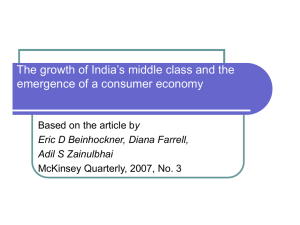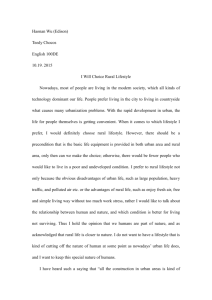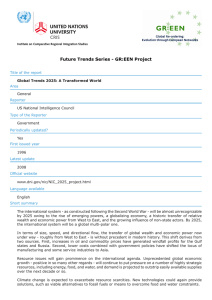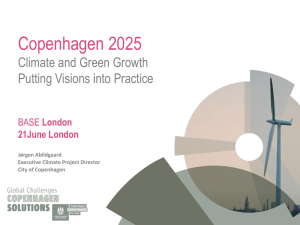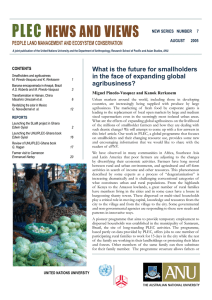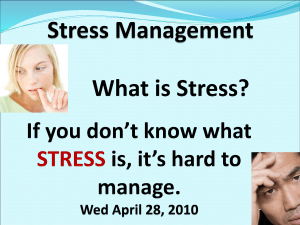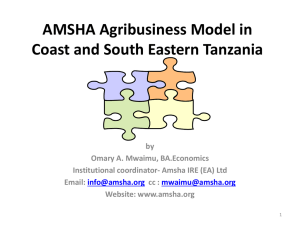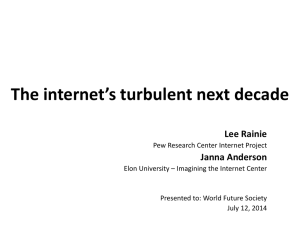Dr. David Kohl`s 2015 Keynote Presentation
advertisement
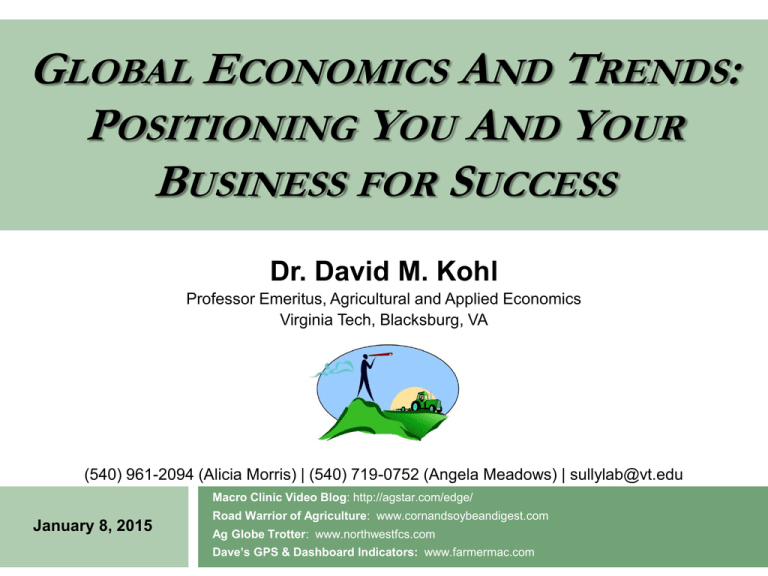
GLOBAL ECONOMICS AND TRENDS: POSITIONING YOU AND YOUR BUSINESS FOR SUCCESS Dr. David M. Kohl Professor Emeritus, Agricultural and Applied Economics Virginia Tech, Blacksburg, VA (540) 961-2094 (Alicia Morris) | (540) 719-0752 (Angela Meadows) | sullylab@vt.edu Macro Clinic Video Blog: http://agstar.com/edge/ January 8, 2015 Road Warrior of Agriculture: www.cornandsoybeandigest.com Ag Globe Trotter: www.northwestfcs.com Dave’s GPS & Dashboard Indicators: www.farmermac.com Commodity Super Cycle Burnout slowing of emerging nations’ economies ethanol & biofuel mandate softening central bank stimulus inefficient infrastructure in emerging nations weather – northern southern hemisphere 2 Grain Industry- “Margin Flipping” easy money has been made top flight managers still earn profit high overhead/fixed cost structure game of chicken with land rents duration of cycle four strategic factors 3 Managing Thru the Cycles Cycle Duration Credit Issues One Year Cycle Repayment Ability Two to Three Year Cycle Repayment Ability/Liquidity Three to Five Year Cycle Repayment Ability/Liquidity/Equity 4 Livestock Industry “Margin Flipping” strategic resource changes over past decade 50 to 65 year olds will not return price, early cycle margins cost, late cycle margins young people migration mistakes made in the best of times duration of the cycle 5 Horticulture, Vegetable, & Retail/Entrepreneurial growth of the economy housing starts lower unemployment growth of local, natural, and organic population dynamics 6 Global Economy Update Country Code Europe Red China Yellow Risk Ranking Russia Red Japan Red Middle East Red • • • • Argentina Red Brazil Red Portugal Red U.S. Green Geopolitical Trade tensions Natural resource Economic reform 7 World Economy PerspectivesEurope German elections zero growth debt levels Euro additions/eliminations currency/other 8 World Economy PerspectivesChina new leadership population shift rural to urban state directed-capital growth consumer based capitalism & growth in Asian exports trade natural resource issues social disruptions debt:shadow banking 9 U.S. Economy Update Indicator Employment • Numbers • Wages • Participation Code Yellow/Red Factory Utilization Housing Green Yellow Oil/Interest Rates LEI & PMI Yellow Green 10 Global Economy geopolitical trade risk volatility in revenues and cost agriculture’s movement to emerging nations opportunity failure premium on planning, execution, and monitoring “Think globally but act locally.” 11 Technology convergence of technology bio tech engineering information/big data high levels of talent innovation vs. technology systems “High tech, high touch.” 12 Consumers local, natural, & organic GMO/non-GMO ethnic groups global consumers consumer trends 2025 “Consumers will drive the business model.” 13 Potpourri Trends 2050 - 70% of the world’s population will be urban 85% of Americans are 2 generations away from farm/ranch animal welfare environmental black swans “Expect the unexpected.” 14 Rural Communities The characteristics of thriving communities are: healthcare & preventive health internet access infrastructure lifestyle amenities such as shopping & recreation “Rural communities will define your business/people strategy.” 15 Education/Lifelong Learning internships experienced education knowledge centers, blended education vocational schools emotional intelligence – 4-H, FFA, rural leadership groups First job Baby Boomers = age 12; Millennials = age 22 “750 universities and colleges will file bankruptcy by 2025??” 16 New Wave of Players under 42 years of age age wave is world wide women minorities lifelong learners new entrants “Hire for attitude, train for aptitude.” 17 Natural Resources quality land is premium water quality & quantity infrastructure issues energy growth vs. efficiency “Local, regional, national, and international conflicts over water.” 18 Transition & Evolution 60% of U.S. farm ground will change hands by 2030 independent vs. interdependent lending: banks, Farm Credit, FSA agribusiness family and business dynamics “Heart vs. head concept.” 19 Global Economic / Government Policy China 2030 debt issues worldwide tax laws new leadership other “You can only imagine!” 20 Strategic 2025 1 CEO/ leaders will be “visionary/champions” vs. “gate keepers” “big enough to serve but small enough to care” alignment & collaboration- agribusiness, education & lenders technology strategy- value added, big data refinement of processes- collaboration, training, & execution human resources- talent alignment, culture, recruit, & retain 21 Strategic 2025 2 knowledge, intellectual research, information Global, domestic, industry, region, & local capital, liquidity, profitability, & efficiency public policy, public regulatory voice education- internal & external- “life long learners” natural resources- demographic, drive your model transition- evolution of customers, association, footprint- corporate vs. family 22 Ten Strategic Rules on Diversification 1 Is your strategy consistent with resources? land facilities human resources Is there a market? “James Bond Plan” takes five to seven years for branding word of mouth marketing “media” 25% more time, money, & resources 23 Ten Strategic Rules on Diversification 2 Have you conducted enterprise analysis? business financial system dashboard business lifecycle- “wonder, blunder, thunder, under” trend is your friend Profit rule: > interest cost/inflation/opportunity costs 24 12 Golden Rules for Business/Lifestyle Success 1 Profit Equation: P=O+C+L+M² Profit Allocation: 60-30-10 Rule People Equation: 40-20-40 Rule Victims & Know It All’s Elimination Bus Rule: Good to Great/ Coach “K” Financial Records that Talk to Business 25 12 Golden Rules for Business/Lifestyle Success 2 Dash Boards: Financial/Production Advisory Teams/Relationship Lender Time Management Rule: 3000/500 hours Spend One Percent of Revenue on Education Children Rule: 50-25-25 Goal Setting Rule: 80-16-4 26
